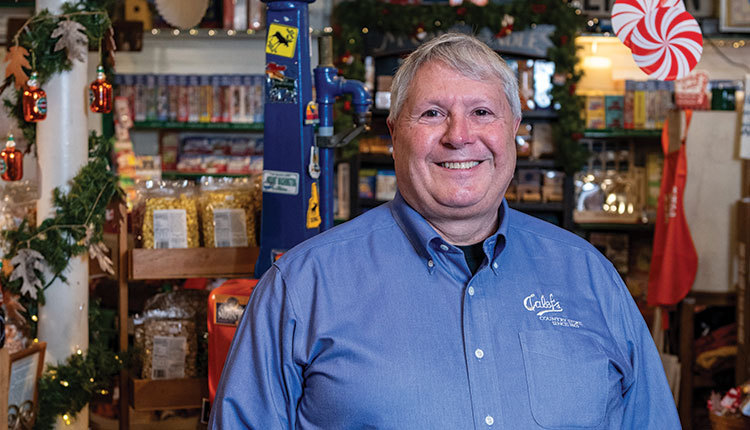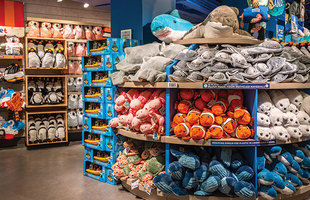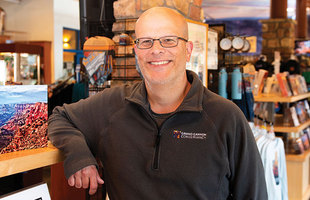Raise your hand if your gift shop or store was open when Ulysses S. Grant was president. Now raise your hand if you can visit a store that your grandmother or great-grandfather visited or perhaps even took you to when you were a child that you can still visit. If you’re like most, your hands are planted firmly at your sides; you might be scratching your head, straining to make a connection to such a place.
But if you’re lucky enough to visit Calef’s Country Store in Barrington, New Hampshire, the memories will come flooding back as soon as you climb the wide wooden steps to the long front porch and open the creaky wooden door that delivers you to the store that’s stuck in time.
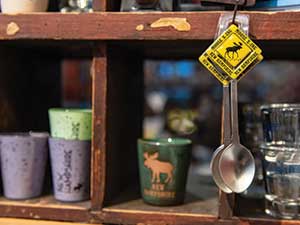
Calef’s Country Store visitors can pick up a New Hampshire souvenir as they explore a wide selection of specialty foods.
Photos: Shawn Pierce
Since 1869, Calef’s has been delighting generations of visitors with New Hampshire-made jams, jellies, cheeses, pickles, deli meats and other culinary classics in its 2,000-square-foot country store. Known for items such as Rat Trap cheddar cheese and fresh-made prepared salads, Owner Greg Bolton says the store evokes nostalgic memories for customers who want to relive them.
“What’s really neat is you’ll get someone to walk in with their kids and they’ll say ‘this was your grandfather’s favorite place he brought me here when I was a kid,’ and they’re walking around remembering being here with their grandparents and they’re doing the same thing for their kids,” he explains. “It feels really good.”
Breaking it down
While the establishment is widely known for perishable goods, it’s not limited to food alone. Beyond the wines, cheeses, chocolates and penny candies, the store stocks candles, toys, books, puzzles, games for kids, coffee mugs, sweatshirts, T-shirts, aprons and towels. Bolton notes non-food items account for 10 to 15% of the store’s inventory.
“There’s really three components to the store,” he notes. “Our most prominent would be our locally sourced New England food products and that includes cheese; then we have some locally sourced New England gift and craft items; and then we have what we call a country deli so sandwiches and fresh-made, prepared salads and those types of things.”
With original shelving lining the walls and artifacts wrapping the walls in memories with postcards, advertisements and products the store has sold over the years, it’s easy to get lost in the treasure trove of goodies and splurge both time and money during a shopping trip.
“When customers come here, they’re happy to be here, they’re not in a rush typically, and they’re not shopping by price; they’re not angry and they’re not demanding things that we don’t have,” Bolton points out. “Running a store like that is a whole lot easier than a typical retail environment where there’s a lot of pressure and people are angry. That doesn’t happen here very often.”
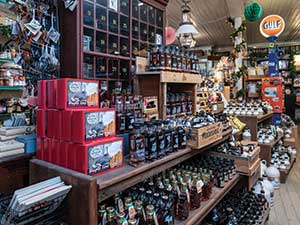
Cupboard staples such as maple syrup are abundant throughout the store.
Bolton, who has owned the store since 2012 with his business partner, Len Angelo, notes that a second gift shop occupies space in the building by another tenant that is not affiliated with the country store. He adds it’s a far cry from the humble beginnings of Calef’s Country Store, which is known as New Hampshire’s first female-owned business.
As the story goes, Mary Chesley Calef mortgaged her family farm just after the Civil War and opened Calef’s Store in the front rooms of her modest home. Five generations of the family operated Calef’s Big Store until the 1990s, according to the store’s website. In that time, portions have been added, but the original bones still remain.
Bolton notes that up until the 1930s and 1940s, the sales clerks would stand behind counters that lined the perimeter of store and hand customers their requested items from the shelves, which are still used today.
Pickles, ginger snaps and cheese
Meanwhile, a candy case welcomes eager children upon entering the store while center displays change merchandise with the seasons. In the back of the store — through a barn-style door — the deli counter gets the biggest workout from locals and transients passing through town.
“We get a lot of repeat business in our deli on a daily basis,” Bolton says. “Then also what I hear an awful lot is people say, ‘We come here and we rent a place for a week in the summer, and we always stop at the beginning and end of our vacation,’ or ‘We’re driving up, and we always stop on our way to wherever we’re going,’ so they may not be three- or four-times-a-week repeat customers, but they come back year after year or season after season.”
And when they arrive, any of the 25 full- or part-time sales associates on the clock that day are waiting to greet guests and help them wade through cupboard staples such as crackers, mustards, sauces, salsas, cocoas, beans and soups provided by 500 to 600 different vendors, Bolton notes.
“My favorite kind of vendor would be a local New England startup trying to get into the food business,” he admits. “Very often we’re contacted by those people because we have a pretty good reputation in the market as a place to carry their products pretty early on in their venture, so I really like supporting those types of vendors.”
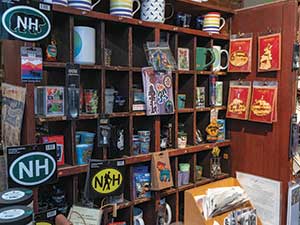
Coffee mugs, stickers, cards, apparel, towels and other non-food items account for 10 to 15% of the store’s inventory.
Among the favorites are RE Kimball & Co. — known for its homemade jams and jellies; Moose Hill Provisions — for maple-syrup-flavored everything; Winfrey’s Fudge & Chocolates — for obvious reasons; the New England Cupboard — for dip and baking mixes; and Maine Homestead Market — for pickled eggs, carrots, beans and an assortment of pickles.
And speaking of pickles, Bolton says, it’s difficult for visitors to resist pickles served up the old-fashioned way — in a barrel.
“If someone was to come in here and they could only buy three things, it would be a pickle, a bag of ginger snaps and piece of Rat Trap cheddar cheese,” Bolton muses. “Those are the three things that everyone seems to have in their basket when they leave regardless of whatever else they might pick up along the way.”
Beyond perishable goods, Bolton says the store does well selling puzzles and old-fashioned, wooden, “back-in-the-day games” supplied by Hudson, Florida-based Creative Crafthouse.
A winning combination
As for a busy season, Bolton notes, “Summer’s busy, foliage is a little bit busier and then the month of December is crazy.”
“We’re a pretty good last-minute shopping destination for people because most of what we have is perishable,” he points out. “We also sell a lot of smoked ham around the holiday times, so people will order a ham to have for Christmas and then they’ll come in three or four days before to pick that up along with cheese and other stuff.”
A revenue booster that Bolton says helps the bottom line every year is gift boxes that local companies use as gifts for employees and customers.
“It’s revenue, but it goes out the back door so it wouldn’t be noticed by customers, but it really helps ramp up the intensity around the holidays,” he says.
Bolton, whose prior experience centers around catering, restaurants and a splash of retail, notes the country store is the perfect combination of food and local flavors.
“I ran a couple of catering companies, I’ve been in a couple of restaurants over the years, and a little bit of retail, but not much, and so when this became available, it had sort of the best of both worlds,” he explains. “The retail part looked fairly straightforward and the food service part had a lot of opportunity for growth. So that’s what attracted it to me in the first place.”
While wandering around the space where even he still occasionally discovers new items, Bolton says the fact that people can return and find everything just as they left it is enough to put a smile on his face.
“The look and the feel of the space is the same as it’s been for a long time, so people walk in and feel like they’re stepping back in time,” he says. “We have a modern point-of-sales system, but it’s kind of hidden so that people don’t really see it and it feels like you’re in an old-time store. When people say that, I feel like we’re winning.”
